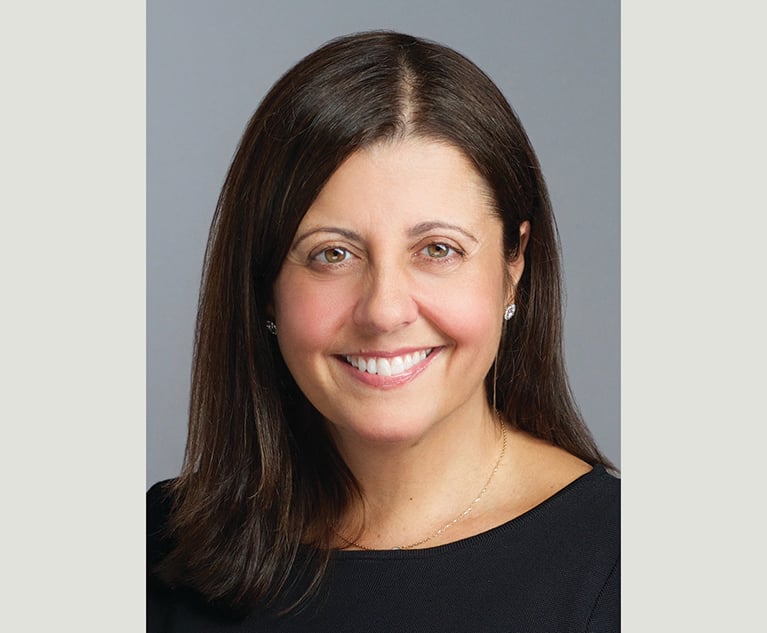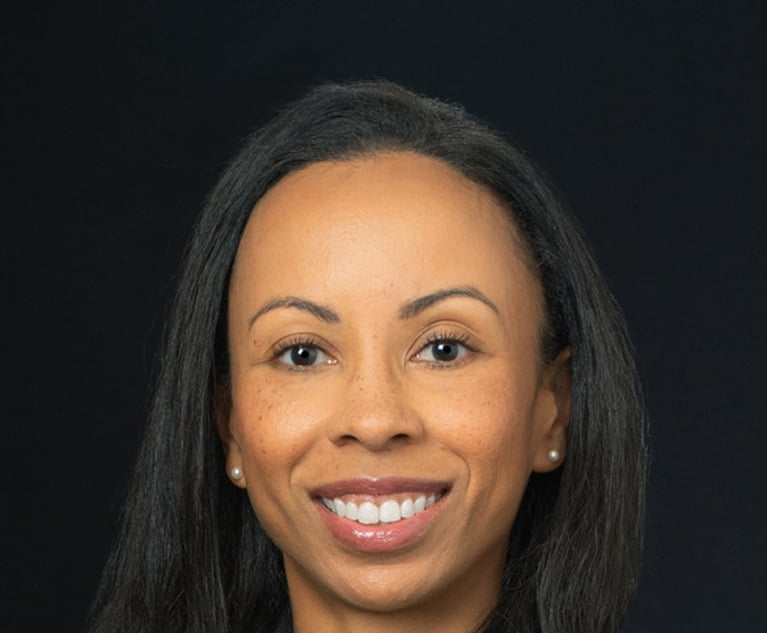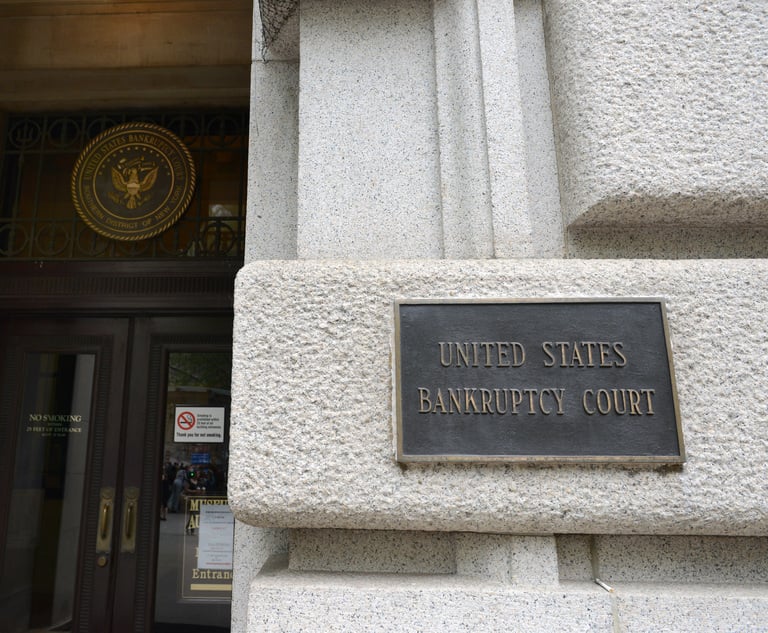 Bronx DA Darcel Clark.
Bronx DA Darcel Clark.Photo: Rick Kopstein/ALM
Bronx DA Will Not Seek SCOTUS Review of Immigrant's Jury Trial Right
Bronx DA Darcel Clark said she is concerned that the recent decision may actually raise the risk of deportation for noncitizens, who would have to reveal their immigration status in order to seek a jury trial for low-level offenses in New York City under the decision.
December 05, 2018 at 01:57 PM
6 minute read
Bronx District Attorney Darcel Clark has said she will not ask the U.S. Supreme Court to review a recent New York Court of Appeals decision on the jury rights of noncitizens in New York City and instead suggested amending a state law that denies jury trials for low-level offenses in the five boroughs.
When the Court of Appeals decided to extend the jury trial right to immigrants facing deportation, Clark had said she would consider asking the U.S. Supreme Court to review the decision as it was explicitly made under the Sixth Amendment to the U.S. Constitution.
Clark in her statement late Tuesday said she was concerned that the recent decision by the Court of Appeals in People v. Suazo may actually raise the risk of deportation for noncitizens, who would have to reveal their immigration status in order to seek a jury trial for low-level offenses in New York City under the decision.
“The risk of deportation is a harsh reality for many Bronx residents,” Clark said. “I am concerned that while the court's decision finds that this defendant was constitutionally entitled to jury trial, it also creates a new burden for noncitizens to reveal their immigration status and establish the risk of deportation in order to take advantage of this newly-announced right to a jury trial.”
Clark said the decision is also problematic because it also places new stress on the state's criminal courts to forecast the outcome of a deportation case in order to weigh that defendant's request to be tried by jury. Those courts are not in the best position to make those predictions, Clark said.
The Court of Appeals disagreed last week in its decision, which said a noncitizen defendant is entitled to a jury trial under the Sixth Amendment if they can show that a risk of deportation would exist following their conviction on a low-level crime. Associate Judge Leslie Stein wrote in the court's opinion that if prosecutors and the defendant disagree about the risk of that individual's deportation, the lower courts will be equipped to sort it out.
“In the event the parties disagree as to the potential immigration consequences of a conviction, we are confident that our courts are competent to resolve such questions as they are presented,” Stein wrote.
The noncitizen defendant in this case was Saylor Suazo, an immigrant who was found guilty in a bench trial on various charges related to an alleged assault. Suazo had asked the trial court to grant him a jury trial, but that request was rejected based on the level of his charges. The case was prosecuted by Clark's office.
A section of the state's criminal procedure law, CPL 340.40, allows a defendant to be denied a trial by jury in New York City if the maximum penalty of a charge is less than six months in jail. Suazo was being charged with class B misdemeanor crimes, which carry a maximum penalty of three months in jail.
That law only applies to defendants in New York City. Individuals outside New York City are otherwise entitled to a trial by jury for those low-level offenses. Clark suggested that the state Legislature should amend that part of the statute to remove the exception for individuals in New York City.
“This statute was enacted decades ago to promote judicial economy, but now, as misdemeanor cases have decreased some 40 percent in the last five years, and deportation looms as a consequence for some defendants, I believe it is time for the legislature to provide jury trials for all New York City residents,” Clark said.
That's the same suggestion Associate Judge Rowan Wilson of the Court of Appeals had in his opinion dissenting from the majority's decision last week. He said the Legislature could discard that inconsistency by eliminating the exception from state law.
“All persons in New York state are entitled to a jury trial if charged with a B misdemeanor, unless they reside in New York City, in which case they have no such right,” Wilson wrote. “Were the Legislature to extend that right to all New Yorkers, the problems underlying this issue would vanish.”
The snag in that situation, as Clark pointed out in a statement last week, is the potential ramifications of such a change. Creating the opportunity for more jury trials in New York City may add to the court system's problem with backlog and other disparities within the criminal justice system that come with it. Clark, a Democrat, said if state lawmakers consider amending the law, they may also want to think about allocating more resources to the state's courts to address an increase in jury trials in New York City.
“This means there will be an increased demand for jury trials and the need for more judges, court parts and courthouse personnel to keep the process from incurring backlogs,” Clark said. “The Bronx DA's Office has worked diligently to reduce the backlog to improve the criminal justice system in the Bronx, and is ready to do more while pursuing justice for victims of crime in our community.”
Nearly three-quarters of the misdemeanor trials in New York City last year were bench trials, according to the Office of Court Administration. A spokesman for OCA did not comment on the possibility of changing the statute, but said they are still studying the potential impact of the Court of Appeals decision in Suazo.
“The consequences, both intended and unintended, from this decision are still being reviewed,” the spokesman said. “Last year, in New York City, there were 159,000 misdemeanor filings in Criminal Court. Of those, there were 645 total misdemeanor trials with 470 being bench trials. Going forward, it will take time to sort out the logistical and legal parameters along with the resulting impact on court operations.”
The Supreme Court's rules allow litigants to seek a writ of certiorari, or review, of a decision by the court of last resort in each state. In the case of New York, that court is the New York Court of Appeals.
READ MORE:
This content has been archived. It is available through our partners, LexisNexis® and Bloomberg Law.
To view this content, please continue to their sites.
Not a Lexis Subscriber?
Subscribe Now
Not a Bloomberg Law Subscriber?
Subscribe Now
NOT FOR REPRINT
© 2024 ALM Global, LLC, All Rights Reserved. Request academic re-use from www.copyright.com. All other uses, submit a request to [email protected]. For more information visit Asset & Logo Licensing.
You Might Like
View All
Patent Trolls Come Under Increasing Fire in Federal Courts

Trade Fixtures in New York Eminent Domain Cases—What Qualifies and How Are They Valued?
10 minute read
Attorneys ‘On the Move’: Morrison Cohen Adds White Collar Partner; Corporate/Securities Partner Joins Olshan
6 minute readTrending Stories
- 1$1.9M Settlement Approved in Class Suit Over Vacant Property Fees
- 2Former Wamco Exec Charged With $600M 'Cherry-Picking' Fraud
- 3Stock Trading App Robinhood Hit With Privacy Class Action 1 Month After Alleged Data Breach
- 4NY High Court Returns Fired Priest's Discrimination Claim to State Agency
- 5Digging Deep to Mitigate Risk in Lithium Mine Venture Wins GM Legal Department of the Year Award
Who Got The Work
Michael G. Bongiorno, Andrew Scott Dulberg and Elizabeth E. Driscoll from Wilmer Cutler Pickering Hale and Dorr have stepped in to represent Symbotic Inc., an A.I.-enabled technology platform that focuses on increasing supply chain efficiency, and other defendants in a pending shareholder derivative lawsuit. The case, filed Oct. 2 in Massachusetts District Court by the Brown Law Firm on behalf of Stephen Austen, accuses certain officers and directors of misleading investors in regard to Symbotic's potential for margin growth by failing to disclose that the company was not equipped to timely deploy its systems or manage expenses through project delays. The case, assigned to U.S. District Judge Nathaniel M. Gorton, is 1:24-cv-12522, Austen v. Cohen et al.
Who Got The Work
Edmund Polubinski and Marie Killmond of Davis Polk & Wardwell have entered appearances for data platform software development company MongoDB and other defendants in a pending shareholder derivative lawsuit. The action, filed Oct. 7 in New York Southern District Court by the Brown Law Firm, accuses the company's directors and/or officers of falsely expressing confidence in the company’s restructuring of its sales incentive plan and downplaying the severity of decreases in its upfront commitments. The case is 1:24-cv-07594, Roy v. Ittycheria et al.
Who Got The Work
Amy O. Bruchs and Kurt F. Ellison of Michael Best & Friedrich have entered appearances for Epic Systems Corp. in a pending employment discrimination lawsuit. The suit was filed Sept. 7 in Wisconsin Western District Court by Levine Eisberner LLC and Siri & Glimstad on behalf of a project manager who claims that he was wrongfully terminated after applying for a religious exemption to the defendant's COVID-19 vaccine mandate. The case, assigned to U.S. Magistrate Judge Anita Marie Boor, is 3:24-cv-00630, Secker, Nathan v. Epic Systems Corporation.
Who Got The Work
David X. Sullivan, Thomas J. Finn and Gregory A. Hall from McCarter & English have entered appearances for Sunrun Installation Services in a pending civil rights lawsuit. The complaint was filed Sept. 4 in Connecticut District Court by attorney Robert M. Berke on behalf of former employee George Edward Steins, who was arrested and charged with employing an unregistered home improvement salesperson. The complaint alleges that had Sunrun informed the Connecticut Department of Consumer Protection that the plaintiff's employment had ended in 2017 and that he no longer held Sunrun's home improvement contractor license, he would not have been hit with charges, which were dismissed in May 2024. The case, assigned to U.S. District Judge Jeffrey A. Meyer, is 3:24-cv-01423, Steins v. Sunrun, Inc. et al.
Who Got The Work
Greenberg Traurig shareholder Joshua L. Raskin has entered an appearance for boohoo.com UK Ltd. in a pending patent infringement lawsuit. The suit, filed Sept. 3 in Texas Eastern District Court by Rozier Hardt McDonough on behalf of Alto Dynamics, asserts five patents related to an online shopping platform. The case, assigned to U.S. District Judge Rodney Gilstrap, is 2:24-cv-00719, Alto Dynamics, LLC v. boohoo.com UK Limited.
Featured Firms
Law Offices of Gary Martin Hays & Associates, P.C.
(470) 294-1674
Law Offices of Mark E. Salomone
(857) 444-6468
Smith & Hassler
(713) 739-1250







